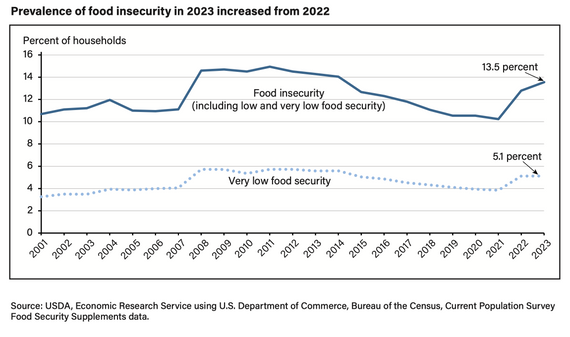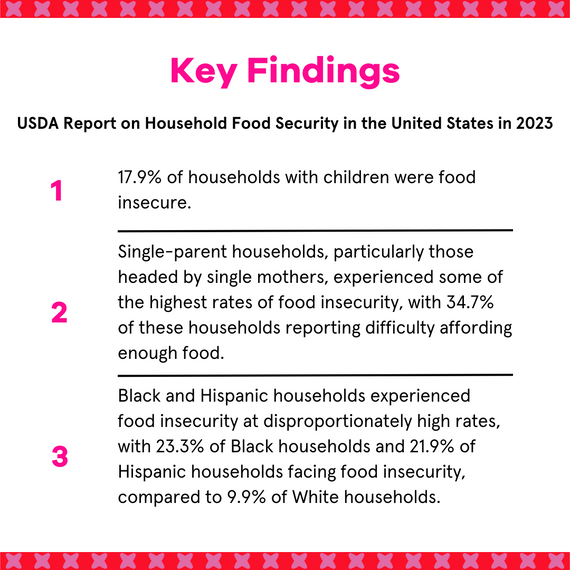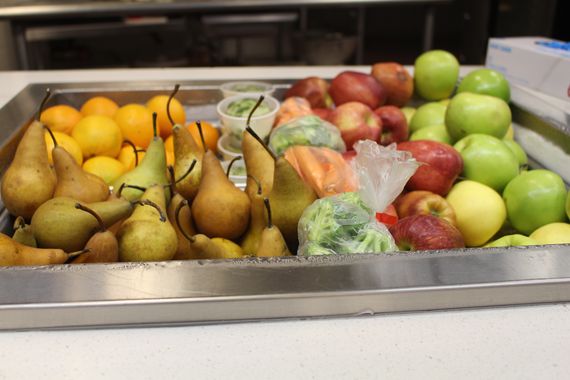2023 USDA Food Security Report Shows Federal-Level Interventions Work
Olivia Deng
Imagine sitting at your kitchen table, fretting about making ends meet to put food on the table for your family. This is the reality for 18 million food-insecure households across the U.S. last year.
The USDA’s latest food security report looks at the state of food access in this country, revealing the challenges many households face in securing enough food for healthy, active lives. With food insecurity rising from the previous year, the report underscores the ongoing issues of hunger and poverty affecting millions.
However, there are solutions. Through policy change, we can attack food insecurity at the root.
This blog post will dive into the following:
-
What is food insecurity?
-
Quick takeaways
-
Key findings from the USDA food security report
-
Solutions to food insecurity
Definitions
What Is Food Insecurity?
The USDA defines food insecurity as a “household-level economic and social condition of limited or uncertain access to adequate food.”
-
Low food security: Food insecurity characterized primarily by reductions in dietary quality and variety.
-
Very low food security: Food insecurity with reports of multiple indications of disrupted eating patterns and reduced food intake.
Quick Takeaways
When we looked at the USDA’s food security report, a few things jumped out at us.
Here’s a quick rundown of the big takeaways:
- Food insecurity is increasing nationwide. In 2023, 13.5 percent of U.S. households experienced food insecurity, up from 12.8 percent in 2022. This indicates a growing challenge in ensuring food access for millions of Americans.
- Food insecurity among households with children has continued to climb, reflecting growing challenges for families. In 2023, 17.9 percent of these households were food insecure at some time, an increase from 17.3 percent in 2022 and 12.5 percent in 2021. Repealing COVID-19 relief programs negatively impacted families.
In 2020, we know many Massachusetts residents worried about affording food for the first time. 382,900 first-time visitors navigated to our website, GettingSNAP.org, to learn more about Supplemental Nutrition Assistance Program (SNAP) and how it could help them access food. We responded to a 106 percent increase from the previous year in call volume to our FoodSource Hotline from people looking for food assistance, taking 45,707 calls!
Federal nutrition programs supported families nationwide to buffer some of the adverse effects brought on by the pandemic, which is likely why we don't see a spike in food insecurity in 2020. However, millions of people still faced unprecedented hardships during this time, particularly BIPOC households and households with children.

Here's what we know works:
-
Federal nutrition programs play a crucial role in supporting U.S. households. They can also strengthen food security at scale. Nationwide, roughly 58.1 percent of food-insecure households relied on one or more of the three largest federal nutrition assistance programs: SNAP, Special Supplemental Nutrition Program for Women, Infants, and Children (WIC), and free school meals. Increasing access to and participation in SNAP and school meals are cornerstones of Project Bread’s approach to providing food security for households in our state. As a result of our work lobbying for free School Meals For All, 100,000 more Massachusetts kids ate free school lunch each day in 2023 compared to 2019, when their meals weren’t free. As of March 2022, Massachusetts surpassed 1 million SNAP recipients in the state. Project Bread has helped 32,142 households learn if they were eligible for SNAP through eligibility pre-screens since 2020 (2020-July 2024).
-
Massachusetts is ahead of the curve nationally in addressing food insecurity. Project Bread successfully led the Feed Kids Coalition and our partners in the legislation to make free school meals for all students permanent, making us currently one of eight states to do so. We are the only state in the country to enact state-level legislation to extend and taper off the COVID-era emergency allotments for SNAP households. Massachusetts households lost $157 in monthly benefits on average when federal emergency allotments were discontinued, so the legislation provided households with a more gradual reduction in benefits to afford food instead of a steep drop. This legislation came from Governor Healey’s office, which Project Bread advocated for and supported households through our FoodSource Hotline.
Our approach to solving hunger permanently via the programmatic and policy solutions that we invest in at Project Bread creates food security for households in our state. We are more encouraged than ever to be on the right track and achieve food security for everyone in Massachusetts.
Key Findings
The 2023 USDA food security report highlighted the disproportionate impact of food insecurity on households with children. It revealed that nationally, 17.9 percent of families with children were food insecure, with 6.5 million families struggling to provide consistent, nutritious meals.
Single-parent households, particularly those headed by single mothers, experienced the highest rates of food insecurity at 34.7 percent. Additionally, Black and Hispanic households faced rates of food insecurity more than double the food insecurity rate for white households.
The report emphasized the link between food insecurity and health, noting that it leads to poor dietary quality and contributes to diet-related diseases. It also highlighted the adverse effects of food insecurity on children, including developmental delays and poor academic performance.

Solutions to Food Insecurity
What Causes Food Insecurity?
While federal nutrition programs provide essential support to millions of Americans, it's clear from the USDA report that more needs to be done to address the root causes of food insecurity. Economic factors like unemployment, underemployment, low wages, and high living costs are significant drivers of food insecurity. Policies that aim to increase wages, provide affordable housing, and improve access to affordable healthcare can help reduce the economic pressures that force families into food insecurity.
Additionally, there is a growing recognition that food insecurity is a racial justice issue. The higher rates of food insecurity among Black and Hispanic households point to systemic inequities that must be addressed to create a more just and equitable food system. Efforts to close the racial wealth gap, eliminate discriminatory practices in employment and housing, and increase access to education and job training for marginalized communities are critical to reducing food insecurity in these populations.
We have long recognized that addressing hunger extends beyond food donations and meal programs — it requires systemic change through public policy. Our work has focused on advocating for legislation that tackles the root causes of hunger and expands access to food assistance programs. Two major areas where we have had a substantial impact are in promoting universal school meals and improving access to SNAP.
School Meals for All: A Win for Childhood Nutrition
One of our most significant policy victories has been our advocacy for universal free school meals. With nearly 18 percent of U.S. households with children facing food insecurity in 2023, ensuring children have access to nutritious meals at school is critical. Our efforts were instrumental in pushing for the adoption of school meals for all, a policy that allows every student, regardless of family income, to receive free meals at school.
This policy has been a game-changer. It reduces the stigma often associated with free or reduced-price lunches and ensures that children have consistent access to healthy food during the school day. According to the USDA, children in food-insecure households often face nutritional deficiencies, which can affect their development and academic performance. Universal free school meals directly combat this issue by providing balanced nutrition to all students, giving them a better chance to thrive in and out of the classroom.

SNAP: Bridging the Gap for Low-Income Households
SNAP continues to be a lifeline for millions of Americans, with about 58 percent of food-insecure households participating in SNAP, WIC, or the National School Lunch Program. However, barriers to accessing SNAP, such as complicated enrollment processes and stigmatization, often prevent eligible families from receiving benefits. Project Bread has been at the forefront of efforts to streamline SNAP access, advocating for policies that simplify enrollment and increase outreach to underrepresented communities.
Our FoodSource Hotline, which assists Massachusetts residents in applying for SNAP benefits, has been vital in connecting families with the resources they need. By providing multilingual support and helping navigate the application process, Project Bread has helped thousands of households secure SNAP benefits, bridging the gap between food insecurity and food security.

Looking Ahead
Continuing the Fight Against Hunger
The USDA’s 2023 food security report highlights the persistent challenges of hunger in the U.S. By focusing on long-term solutions like universal school meals and improving SNAP access, we are creating lasting change in the fight against hunger. As food insecurity continues to rise, we must support policies that provide equitable access to food for all.
Our advocacy and policy work demonstrates how systemic change can address the root causes of hunger. Our commitment to ensuring that every person has access to nutritious food, regardless of income, is a crucial step toward a more food-secure future.
Ending hunger takes all of us. We invite you to get involved in our work and join us in creating food security for everyone in Massachusetts.